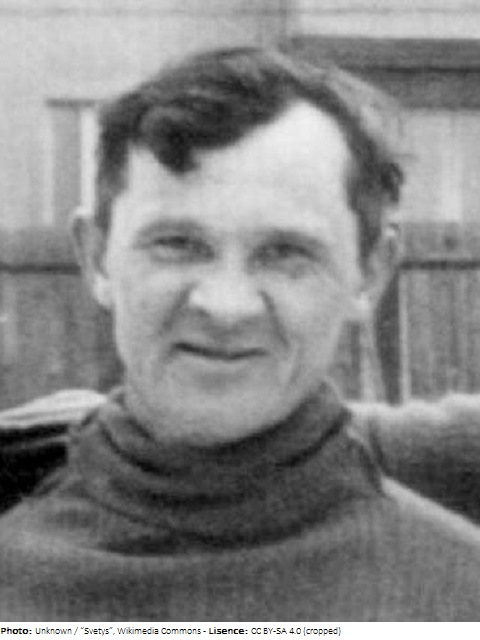Kęstutis Bulota

Biographical information
| Roles | Competed in Olympic Games • Opening Flagbearer |
|---|---|
| Sex | Male |
| Full name | Kęstutis•Bulota |
| Used name | Kęstutis•Bulota |
| Born | 23 October 1896 in Tallinn, Harjumaa (EST) |
| Died | 1941 in Sosva, Sverdlovsk (RUS) |
| NOC |  Lithuania Lithuania |
Biography
Kęstutis Bulota was Lithuania’s first representative at the Winter Olympics, and as of 2012, the nation’s only international speed skating competitor. Besides the 1928 Olympics, he also contested the 1928 World Championships, which were held a week prior to the Games in Davos, placing 21st. But Bulota was a sporting pioneer in his native Lithuania. He was one of the founders of the LFLS in Kaunas, a major driver in the development of sports in the country. He later succeeded his father (Lt. General Jonas Jurgis Bulota) in the presidency over the club. Under the banner of LFLS, Bulota claimed successes in various sports. In 1922 and 1923, he won the national football title, and in 1926, 1931 and 1934 he helped LFLS win the ice hockey crown. Individually, he earned Lithuanian titles in track cycling and in athletics, winning events as diverse as the 1 mile walk, the 4 x 100 m relay, the standing high jump and the hammer throw. Outside sports, Bulota was active as a civil enginer, having studied in Berlin in the early 1930s. The details of Bulota’s death are unclear. He was arrested by the Soviet secret police (NKVD) on 14 June 1941 (some sources say 14 October 1941), and he was deported to a Gulag camp, where he died in late 1941 or possibly early 1942.
Personal Bests: 500 – 50.1 (1928); 1500 – 2:40.2 (1928); 5000 – 9:41.0 (1928); 10000 – 19:47.2 (1928).
Results
| Games | Discipline (Sport) / Event | NOC / Team | Pos | Medal | As | |
|---|---|---|---|---|---|---|
| 1928 Winter Olympics | Speed Skating (Skating) |  LTU LTU |
Kęstutis Bulota | |||
| 500 metres, Men (Olympic) | =28 | |||||
| 1,500 metres, Men (Olympic) | 25 | |||||
| 5,000 metres, Men (Olympic) | 25 | |||||
| 10,000 metres, Men (Olympic) |
Other participations
| Games | Role | NOC | As | |
|---|---|---|---|---|
| 1928 Winter Olympics | Flagbearer at the Opening Ceremony |  LTU LTU |
Kęstutis Bulota |
Olympic family relations
- Son of Jonas Jurgis Bulota
List mentions
- Listed in Olympians Who Were Killed or Missing in Action or Died as a Result of War (Died late 1941 or early 1942 in Sosva prison camp.)
Errata
Date of death previously given as 14 June 1941, but this is the date, when he was deported to the Sosva prison camp. He died there later, in late 1941 or early 1942.